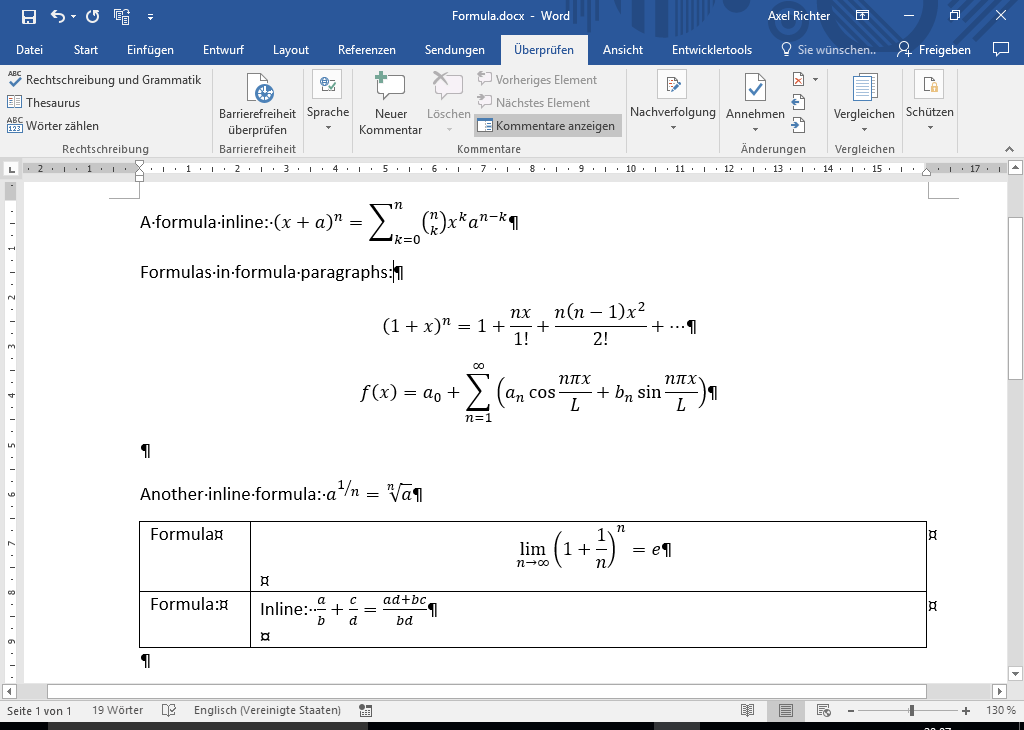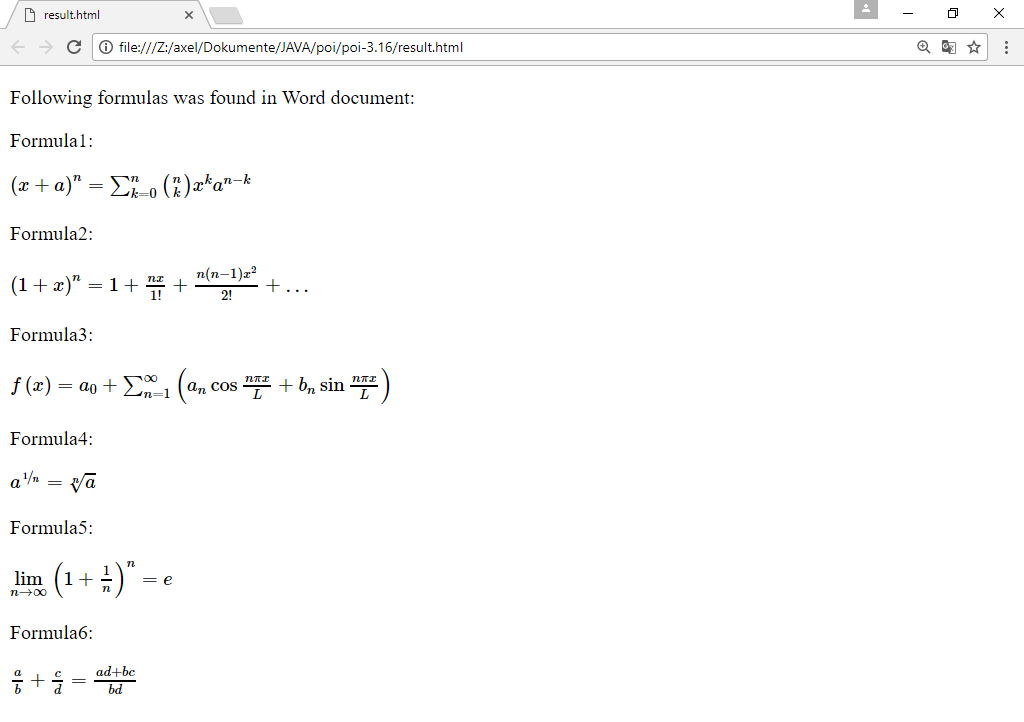Word *.docx files are ZIP archives containing XML files which are Office Open XML. The formulas contained in Word *.docx documents are Office MathML (OMML).
Unfortunately this XML format is not really well known outside Microsoft Office. So it is not directly usable in HTML for example. But fortunately it is XML and as such it is transformable using Transforming XML Data with XSLT. So we can transform that OMML into MathML for example, which is usable in a wider area of use cases.
A transformation process via XSLT mainly bases on a XSL definition of the transformation. Unfortunately creating a such is also not really easy. But fortunately Microsoft has done that already and if you have a current Microsoft Office installed, you can find this file OMML2MML.XSL in the Microsoft Office program directory in %ProgramFiles%\. If you don't find it, do a web research to get it.
So if we are knowing this all, we can getting the OMML from the XWPFDocument, transforming it into MathML and then saving that for later usage.
My example stores the found formulas as MathML in a ArrayList of strings. You should also be able storing this strings in your data base.
The example needs the full ooxml-schemas-1.3.jar as mentioned in https://poi.apache.org/faq.html#faq-N10025. This is because it uses CTOMath which is not shipped with the smaller poi-ooxml-schemas jar.
Word document:
![enter image description here]()
Java code:
import java.io.*;
import org.apache.poi.xwpf.usermodel.*;
import org.openxmlformats.schemas.wordprocessingml.x2006.main.CTP;
import org.openxmlformats.schemas.officeDocument.x2006.math.CTOMath;
import org.openxmlformats.schemas.officeDocument.x2006.math.CTOMathPara;
import org.w3c.dom.Node;
import javax.xml.transform.Transformer;
import javax.xml.transform.TransformerFactory;
import javax.xml.transform.dom.DOMSource;
import javax.xml.transform.stream.StreamSource;
import javax.xml.transform.stream.StreamResult;
import java.awt.Desktop;
import java.util.List;
import java.util.ArrayList;
/*
needs the full ooxml-schemas-1.3.jar as mentioned in https://poi.apache.org/faq.html#faq-N10025
*/
public class WordReadFormulas {
static File stylesheet = new File("OMML2MML.XSL");
static TransformerFactory tFactory = TransformerFactory.newInstance();
static StreamSource stylesource = new StreamSource(stylesheet);
static String getMathML(CTOMath ctomath) throws Exception {
Transformer transformer = tFactory.newTransformer(stylesource);
Node node = ctomath.getDomNode();
DOMSource source = new DOMSource(node);
StringWriter stringwriter = new StringWriter();
StreamResult result = new StreamResult(stringwriter);
transformer.setOutputProperty("omit-xml-declaration", "yes");
transformer.transform(source, result);
String mathML = stringwriter.toString();
stringwriter.close();
//The native OMML2MML.XSL transforms OMML into MathML as XML having special name spaces.
//We don't need this since we want using the MathML in HTML, not in XML.
//So ideally we should changing the OMML2MML.XSL to not do so.
//But to take this example as simple as possible, we are using replace to get rid of the XML specialities.
mathML = mathML.replaceAll("xmlns:m=\"http://schemas.openxmlformats.org/officeDocument/2006/math\"", "");
mathML = mathML.replaceAll("xmlns:mml", "xmlns");
mathML = mathML.replaceAll("mml:", "");
return mathML;
}
public static void main(String[] args) throws Exception {
XWPFDocument document = new XWPFDocument(new FileInputStream("Formula.docx"));
//storing the found MathML in a AllayList of strings
List<String> mathMLList = new ArrayList<String>();
//getting the formulas out of all body elements
for (IBodyElement ibodyelement : document.getBodyElements()) {
if (ibodyelement.getElementType().equals(BodyElementType.PARAGRAPH)) {
XWPFParagraph paragraph = (XWPFParagraph)ibodyelement;
for (CTOMath ctomath : paragraph.getCTP().getOMathList()) {
mathMLList.add(getMathML(ctomath));
}
for (CTOMathPara ctomathpara : paragraph.getCTP().getOMathParaList()) {
for (CTOMath ctomath : ctomathpara.getOMathList()) {
mathMLList.add(getMathML(ctomath));
}
}
} else if (ibodyelement.getElementType().equals(BodyElementType.TABLE)) {
XWPFTable table = (XWPFTable)ibodyelement;
for (XWPFTableRow row : table.getRows()) {
for (XWPFTableCell cell : row.getTableCells()) {
for (XWPFParagraph paragraph : cell.getParagraphs()) {
for (CTOMath ctomath : paragraph.getCTP().getOMathList()) {
mathMLList.add(getMathML(ctomath));
}
for (CTOMathPara ctomathpara : paragraph.getCTP().getOMathParaList()) {
for (CTOMath ctomath : ctomathpara.getOMathList()) {
mathMLList.add(getMathML(ctomath));
}
}
}
}
}
}
}
document.close();
//creating a sample HTML file
String encoding = "UTF-8";
FileOutputStream fos = new FileOutputStream("result.html");
OutputStreamWriter writer = new OutputStreamWriter(fos, encoding);
writer.write("<!DOCTYPE html>\n");
writer.write("<html lang=\"en\">");
writer.write("<head>");
writer.write("<meta charset=\"utf-8\"/>");
//using MathJax for helping all browsers to interpret MathML
writer.write("<script type=\"text/javascript\"");
writer.write(" async src=\"https://cdnjs.cloudflare.com/ajax/libs/mathjax/2.7.1/MathJax.js?config=MML_CHTML\"");
writer.write(">");
writer.write("</script>");
writer.write("</head>");
writer.write("<body>");
writer.write("<p>Following formulas was found in Word document: </p>");
int i = 1;
for (String mathML : mathMLList) {
writer.write("<p>Formula" + i++ + ":</p>");
writer.write(mathML);
writer.write("<p/>");
}
writer.write("</body>");
writer.write("</html>");
writer.close();
Desktop.getDesktop().browse(new File("result.html").toURI());
}
}
Result:
![enter image description here]()
Just tested this code using apache poi 5.0.0 and it works. You need poi-ooxml-full-5.0.0.jar for apache poi 5.0.0. Please read https://poi.apache.org/help/faq.html#faq-N10025 for what ooxml libraries are needed for what apache poi version.



